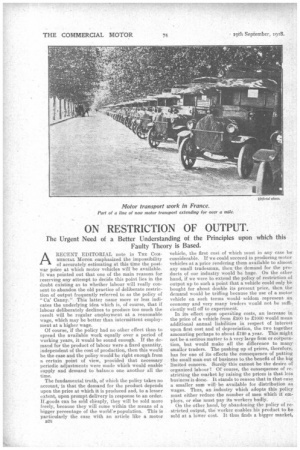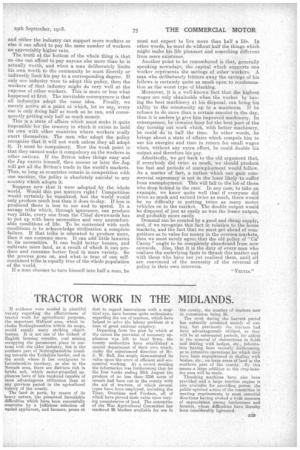ON RESTRICTION OF OUTPUT.
Page 8

Page 9

If you've noticed an error in this article please click here to report it so we can fix it.
The Urgent Need of a Better Understanding of the Principles upon which this Faulty Theory is Based.
ARECENT EDITORIAL note in THE COMMERCIAL MOTOR emphasized the impossibility of accurately estimating at this time the postwar price at which motor vehicles will be available. It was pointed out that one of the main reasons for reserving any attempt to decide this point lies in the doubt existing as to whether labour will really consent to abandon the old practice of deliberate restriction of output frequently referred to as the policy of "Ca' Canny." This latter name more or less indicates the underlying idea which is, of course, that if labour deliberately declines to produce too much the result will be regular employment at a reasonable. wage, which may be better than intermittent employ ment at a higher wage. • Of course, if the policy had no other effect than to spread the available work equally over a period of working years, it would be sound enough. If the demand for the product of labour were a fixed quantity, independent of the cost of production, then this would be the case and the policy would be right enough from a certain point of view, provided that necessary periodic adjustments were made which would enable supply and demand to balance one another all the time.
The fundamental truth, of which the policy takes no account, is that the demand for the product depends upon the price at which it is produced and, to a lesser extent, upon prompt delivery in response to an order. If .goods can be sold cheaply, they will be sold more freely, because they will come within the means of a bigger percentage of the world's., population. This is particularly the case with an article like a motor vehicle, the first cost of which must in any case be considerable. If we could succeed in producing motor vehicles at a price rendering them available to almost any small tradesman, then the demand for the products of our industry would be huge. On the other hand, if we were to extend the policy of restriction of output up to such a point that a vehicle could only be bought for about double its present price, then the demand would be trifling because the use of a motor vehicle on such terms would seldom represent an economy and very many traders would not be sufficiently well off to experiment. In its effect upon operating costs, an increase in the price of a vehicle from 2500 to 21000 would mean additional annual liabilities in respect of interest upon first cost and of depreciation, the two together amounting perhaps to about 2120 a year_ This might not be a serious matter to a very. large firm or corporation, but would make all the difference to many smaller traders. The pushing up of prices, therefore, has for one of its effects the consequence of putting the small man out of business to the benefit of the big limited concern. Surely this cannot be the desire of organized labour ? Of course, the consequence of restriding the market by raising the prices is that less business is done. It stands to reason that in that case a smaller sum will be available for distribution as wages. Thus, an industry which adopts this policy must either reduce the number of men which it employs, or else must pay its workers badly.
On the other hand, by abandoning the policy of restricted output, the worker enables his product to be sold at a lower cost. It thus finds a bigger market, and either the industry can support more workers or else it can afford to pay the same number of workers an appreciably higher rate. The truth at the bottom of the whole thing is that no one can afford to pay anyone else more than he is actually worth, and when a man deliberately limits his own worth to the community he must directly or indirectly limit his pay to a corresponding degree. If only one industry were to adopt this policy, then the workers of that industry might do very well at the expense of other workers. This is more or less what happened at first. The inevitable consequence is that all industries adopt the same idea. Finally, we merely arrive at a point at which, let us say, every one is only doing half as much as he can, and consequently getting only half as much money.
This is a state of affairs which must make it quite impossible for the country in which it exists to hold its own with other countries where workers really exert themselves. The men who adopt the policy recognize that it will not work unless they all adopt i it. It must be compulsory. Now the weak point s that they cannot make it compulsory on the workers in other nations. If the Briton takes things easy-and the Jap exerts himself, then sooner or later the Jap will get all the Briton's trade in the world's markets. Thus, so long as countries remain in competition with one another, the policy is absolutely suicidal to any country which adopts it.
Suppose now that it were adopted by the whole world. Would this put matters right I Competition would certainly be equalized, but the world would only produce much less than it does to-day. If less is produced there is less to use and to spend. In a savage tribe which, through ignorance, can produce very little, every one from the Chief downwards has to put up with bare necessities and very uncomfortable conditions of life. To be contented with such conditions is to acknowledge civilization a complete failure. If that tribe is educated to produce more, then it can consume more. It can add little luxuries to its necessities. It can build better houses, and cultivate more land, as a result of which it can produce and consume better food in more variety. So the process goes on, and what is true of one selfcontained tribe is equally true of the whole population of the world.
If a man chooses to turn himself into half a man, he must not expect to live more than half a life. In other words, he must do without half the things which might make his life pleasant and something different from mere existence.
Another point to be remembered is that, generally speaking nowadays, the capital which supports one worker represents the savings of other workers. A man who deliberately fritters away the savings of his fellows is certainly quite as much open to condemnation as the worst type of blackleg.
Moreover, it is a well-known fact that the highest wages are only obtainable when the worker by having the best machinery at his disposal, can bring his utility to the cdmmunity up to a maximum. If he refuses to do more than a certain amodnt in the day, then it is useless to. give him improved machinery. In consequence, he remains busy for the best *Part of the day turning out work which, with better machinery, he could do 'in half the time. In other words, he brings about a state of affairs which compels him to use his energies and time in return for small wages when, without any extra effort, he could double his output and therefore his pay.
Admittedly, we get back to the old argument that, if everybody did twice as much, we should produce too fast and periods of unemployment would follow. As a matter of fact, a nation 'which can gain commercial supremac3i is not in the least likely to suffer from unemployinent. This will fall-to the lot of those who drop behind in the race. In any case, to take an example, we know quite well that if everyone did twice as much and earned twice as much, there would be no difficulty in putting twice as many motor vehicles on to the market. The double output would be disposed of just as easily as was the lesser output, and probably more easily Demand can be created by a good and cheap supply, and, if we recognize this fact. in relation to the home Markets, and the fact that we must get ahead of competitors as to value for money in the oversee markets, then we must surely agree that the old policy of "Ca' Canny '.' ought to be completely abandoned from now onwards. .Also, that it is the duty of every man who realizes the underlying fkKts to thrash this matter out with those who have not yet realized them, until all are convinced of the necessity of the reversal of policy_in their own interests. VECTIS."






















